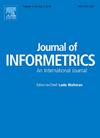Forecasting topic trends of blockchain utilizing topic modeling and deep learning-based time-series prediction on different document types
IF 3.5
2区 管理学
Q2 COMPUTER SCIENCE, INTERDISCIPLINARY APPLICATIONS
引用次数: 0
Abstract
Topic trends in rapidly evolving domains like blockchain are dynamic and pose prediction challenges. To address this, we propose a novel framework that integrates topic modeling, clustering, and time-series deep learning models. These models include both non-graph-based and graph-based approaches. Blockchain-related documents of three types—academic papers, patents, and news articles—are collected and preprocessed. Random and topic subgraphs are constructed as inputs for model training and forecasting across various time epochs. The four models (LSTM, GRU, AGCRN, and A3T-GCN) are trained on random subgraphs, and the trained models forecast topic trends using topic subgraphs. We also analyze the distinctive characteristics of each document type and investigate the causal relationships between them. The results indicate that non-graph-based models, such as LSTM, perform better on periodic data like academic papers, whereas graph-based models, such as AGCRN and A3T-GCN, excel at capturing non-periodic patterns in patents and news articles. Our framework demonstrates robust performance, offering a versatile tool for blockchain-related trend analysis and forecasting. The code and environments are available at https://github.com/textmining-org/topic-forecasting.
利用主题建模和基于深度学习的时间序列预测不同文档类型的区块链主题趋势
在区块链等快速发展的领域中,主题趋势是动态的,并提出了预测挑战。为了解决这个问题,我们提出了一个新的框架,它集成了主题建模、聚类和时间序列深度学习模型。这些模型包括非基于图的方法和基于图的方法。收集和预处理三种类型的区块链相关文件:学术论文、专利和新闻文章。构建随机子图和主题子图作为模型训练和预测的输入。LSTM、GRU、AGCRN和A3T-GCN四个模型在随机子图上进行训练,训练后的模型使用主题子图预测主题趋势。我们还分析了每种文件类型的独特特征,并调查了它们之间的因果关系。结果表明,非基于图的模型(如LSTM)在周期性数据(如学术论文)上表现更好,而基于图的模型(如AGCRN和A3T-GCN)在捕获专利和新闻文章中的非周期性模式方面表现更好。我们的框架展示了强大的性能,为区块链相关的趋势分析和预测提供了一个通用的工具。代码和环境可在https://github.com/textmining-org/topic-forecasting上获得。
本文章由计算机程序翻译,如有差异,请以英文原文为准。
求助全文
约1分钟内获得全文
求助全文
来源期刊

Journal of Informetrics
Social Sciences-Library and Information Sciences
CiteScore
6.40
自引率
16.20%
发文量
95
期刊介绍:
Journal of Informetrics (JOI) publishes rigorous high-quality research on quantitative aspects of information science. The main focus of the journal is on topics in bibliometrics, scientometrics, webometrics, patentometrics, altmetrics and research evaluation. Contributions studying informetric problems using methods from other quantitative fields, such as mathematics, statistics, computer science, economics and econometrics, and network science, are especially encouraged. JOI publishes both theoretical and empirical work. In general, case studies, for instance a bibliometric analysis focusing on a specific research field or a specific country, are not considered suitable for publication in JOI, unless they contain innovative methodological elements.
 求助内容:
求助内容: 应助结果提醒方式:
应助结果提醒方式:


